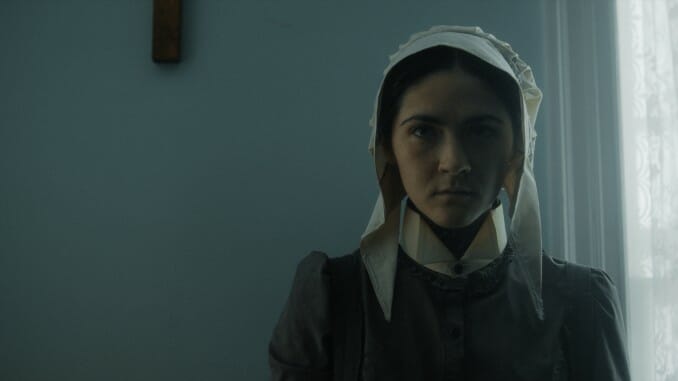The Last Thing Mary Saw Feels Like a Plodding Subplot of an 1800s Chiller

I have no stylistic preconceptions about blasphemous period transportations like The Last Thing Mary Saw. Count me as one of many who found themselves transfixed by Robert Eggers’ The Witch. Storytelling that flashes backward to puritanical 1600s or 1800s condemnations in God’s name doesn’t have to feel outdated or like bygone entertainment, but The Last Thing Mary Saw can’t crack such a code. Edoardo Vitaletti dares chastise our forefathers’ shameful homophobia, seen as the devil’s curse, only to sluggishly recount a ghost story too quiet to overcome sleepier village atmospheres.
It’s a story of forbidden passion as Mary (Stefanie Scott) is frowned upon for lustfully frolicking with maid Eleanor (Isabelle Fuhrman). Mary’s family is keen on the poorly kept secret, which puts a target on Eleanor. When the family’s matriarch (Judith Roberts) croaks, Mary finds herself under even more scrutiny. The dangerous nature of Mary’s relationship with Eleanor worsens as the matriarch’s funeral looms, but why should she accept blame? Mary and Eleanor’s happiness exists above all else, although their methods may doom what was once an innocent connection.
The Last Thing Mary Saw challenges production designers to recreate Southold, New York 1843, and it’s a moody, musty stripping of modernization. Conservative costumes and a creaky manor are dressed appropriately as God-fearing townsfolk at the time would favor, which is admittedly half the film’s battle. Audiences must believe the cast’s surroundings, from chicken coops to candlelight, folktale warnings to “impure” lifestyles. Vitaletti’s recreation lives in its olden dialects and stripped-down settings, to the point where reenactment vibes might say enough for religious period purists.
-

-

-

-

-

-

-

-

-

-

-

-

-

-

-

-

-

-

-

-

-

-

-

-

-

-

-

-

-

-

-

-

-

-

-

-

-

-

-

-








































